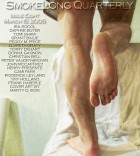The story builds so effortlessly to this final image of tremendous loss. What comes to you first, the imagery of the story or the story itself?
Thanks. In this case the starting point for me was definitely the image of a little boy spilling out of the ocean onto a beach in front of a vagrant. That they both might want something— that’s where it started to become a story for me.
The story begins with Lee searching the sea. Do you think he finds there what he wants? What he needs?
Without wanting to sound too bleak, I’m guessing that he doesn’t. I guess what he really needs is someone to let him know he’s a good person, he helped somebody, he’s not a total screw up. The fantasy of his dad and his kid brother seeing him as a hero and welcoming him back is way out of reach. And his reality’s pretty desperate. Had he actually pulled the boy from the sea; or if the park ranger or cop were nicer to him; or if the boy’s father thanked him; or if the boy even turned and waved when being led away—I think that something, anything from these people could help to center Lee; to give him a glimpse of real esteem and hope; to put him where he needs to be, between fantasy and reality.
Am I crazy for thinking the line “I’m not your dad” has tremendous emotional pull and power?
I really appreciate your pointing this out because I think, without being too deliberate when I wrote it, that Lee reacts quickly and defensively when the boy asks ‘Dad?’ I don’t know whether or not the boy’s asking for his Dad, or asking Lee if he is Dad, or if it’s just the first disoriented thing that spurts out of his mouth after rolling around in the ocean for a while. But this moment is what sets Lee off on his little fantasy about his own father. And the fantasy starts off innocently enough, but before you know it, he’s soaking in it.
Do you workshop your stories? If so, why? What do you get from workshop that you can’t get anywhere else? (Besides public humiliation and a deflation of all your writerly dreams)
You know I just joined my first workshop four weeks ago and, so far, they’ve been surprisingly kind. I’ve been writing alone for a long time, but I started getting more serious four years ago when a friend talked me into doing a reading. So I started writing for readings, more than for workshops or for publication. Readings are terrifying, and provide plenty of public humiliation and deflation; but the fear drives me to really work much harder at clarity, image, character, dialogue. My wife, also a writer, is a great editor; in our bits of spare time between work and kids we trade off writing time and edit each other’s work. Talk about deflation, though. When something’s not working in a story, believe me, your spouse will let you know it.
Tell us more about the New York Writers Coalition for “disenfranchised New Yorkers.” I didn’t know such New Yorkers existed.
I think the word ‘disenfranchised’ might land me in the doghouse somewhere, but I’m glad you asked about New York Writers Coalition, run by writer Aaron Zimmerman and about 15 writer/activists. They lead incredible, ongoing, really positive workshops for formerly homeless adults; teen girls at risk of gang involvement, people coming out of the criminal justice system, World Trade Center survivors, seniors, people with terminal illness. The work these writers produce is really powerful and inspiring; I carry around their anthologies and read one or two little stories every so often on the subway, and they just kill me. I’d encourage anyone reading this to visit our website www.nywriterscoalition.org or, if you’re in New York City, come to one of our readings, held the first Friday of most months at 7:30 in the renovated Tea Room of the Prince George Hotel on East 28th Street.



 The core workshop of SmokeLong Fitness is all in writing, so you can take part from anywhere at anytime. We are excited about creating a supportive, consistent and structured environment for flash writers to work on their craft in a community. We are thrilled and proud to say that our workshop participants have won, placed, or been listed in every major flash competition. Community works.
The core workshop of SmokeLong Fitness is all in writing, so you can take part from anywhere at anytime. We are excited about creating a supportive, consistent and structured environment for flash writers to work on their craft in a community. We are thrilled and proud to say that our workshop participants have won, placed, or been listed in every major flash competition. Community works.